Reply To:
Name - Reply Comment
Yellow-eared amazon
On March 26, a couple arriving from Thailand was arrested with 88 live animals brought into the Bandaranaike International Airport.
Bandaranaike International Airport.
The animals included frogs, salamanders, hedgehogs, rats, lizards, turtles, hamsters and a rare kind of worm. In December 2023, a consignment of 330 birds from Suriname (a small country on the northeastern coast of South America) arrived at the Mattala Mahinda Rajapaksa International Airport via a charter plane. However, in this case, the importer had allegedly not possessed the necessary documentation including the licence and permits prior to engaging in the import business. But to make matters more complicated, even though Sri Lanka Customs has confiscated the 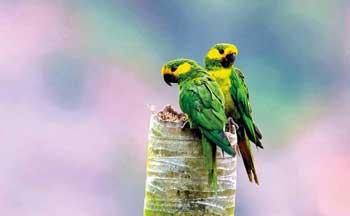 consignment, the Department of Animal Production and Health (DAPH) has allegedly released the birds back to the importer/suspect to be kept at his privately owned quarantine facility; which critics opine is a decision made while breaching the law. In this backdrop, speculation is rife whether Sri Lanka has already become a hub for illegal wildlife trade.
consignment, the Department of Animal Production and Health (DAPH) has allegedly released the birds back to the importer/suspect to be kept at his privately owned quarantine facility; which critics opine is a decision made while breaching the law. In this backdrop, speculation is rife whether Sri Lanka has already become a hub for illegal wildlife trade.
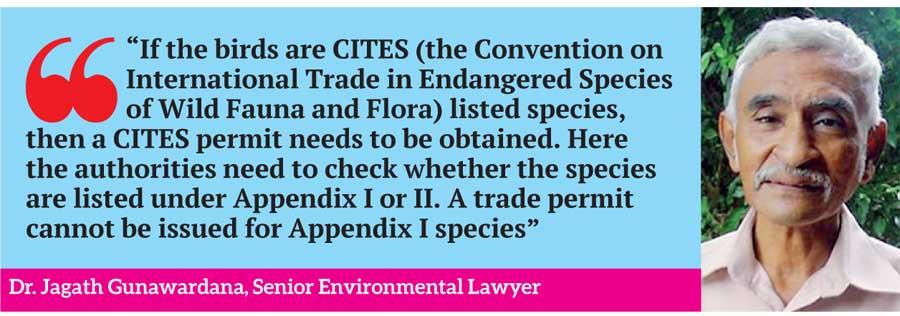
A breach of laws
As per the law, before bringing any ‘live’ animal to Sri Lanka, prior authorisation must be obtained from the DAPH. The importers must send a request with a brief project proposal to DAPH Director General specifying the type of import, the country of origin, facilities available and the location where animals will be kept to obtain the updated Health requirements from DAPH. Based on that a specimen International Health certificate should be obtained from the responsible government veterinary authority of the exporting country. The applications should be forwarded to the DAPH at least two weeks prior to the import, according to Animal Disease Act 59 of 1992, Provision 3.
However in the case of the 330 birds imported from Suriname, the authorities had allegedly decided to release the birds back to the importer/ suspect to be kept at his quarantine facility in Hambantota until he finalised the permits and licences required for the import of the birds. But this provides the space for the suspect to keep the illegally imported animals while the permits may be processed retrospectively. Yet, the law prohibits the processing of permits retrospectively.
In December 2023, a consignment of 330 birds from Suriname arrived at the Mattala International Airport via charter plane
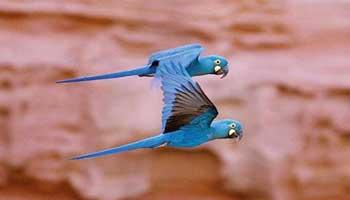 At a recent CITES Standing Committee meeting in November 2023, concerns were raised about the illegal trade in live birds from Suriname following the largest documented seizure of Lear’s Macaws, one of the rarest parrot specie
At a recent CITES Standing Committee meeting in November 2023, concerns were raised about the illegal trade in live birds from Suriname following the largest documented seizure of Lear’s Macaws, one of the rarest parrot specie
“Prior to importing live animals the importer has to get the health certificate under the Flora and Fauna Protection Ordinance (FFPO) issued by the Department of Wildlife Conservation (DWC),” said Dr. Jagath Gunawardana, Senior Environmental Lawyer. “If the birds are CITES (the Convention on International Trade in Endangered Species of Wild Fauna and Flora) listed species, then a CITES permit needs to be obtained. Here the authorities need to check whether the species are listed under Appendix I or II. A trade permit cannot be issued for Appendix I species. The DAPH should then issue a quarantine certificate under the Animal Disease Act. Based on the DAPH recommendations the import/export controller can then give the clearance to import the live animals,”
He further said that the DAPH should have kept the birds at a government quarantine facility instead of keeping it at a premises owned by the suspect. “Hence there seems to be a fundamental flaw in the entire process. On the other hand, the DWC cannot give any approvals retrospectively. The animals need to be quarantined the moment the DAPH receives a shipment and they cannot be taken into the country at any circumstance. But in this case the animals were released to the suspect. If at least one bird carried a disease all other birds will be infected,” Dr. Gunawardana.
The birds should test negative for any disease and records of any tests, vaccinations and treatments should be submitted to the DAPH Director General at least five days prior to the loading of animals. The original international veterinary Health certificate in accordance with the specimen, and originals of prescribed documents mentioned in the application, should be submitted to the Animal quarantine officers on arrival of the consignment/ at the time clearance.
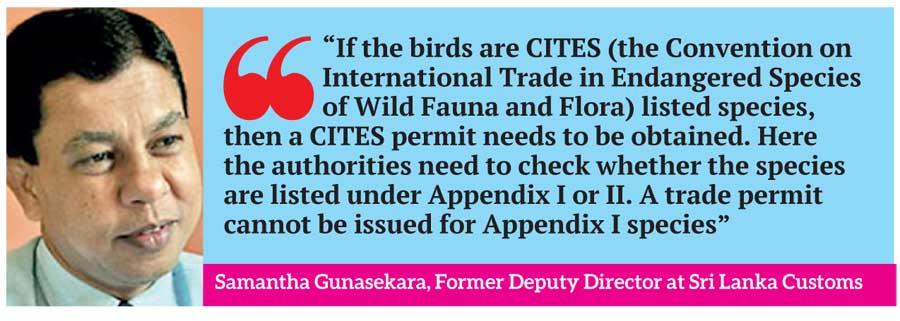
Wildlife trafficking and India
According to the World Wide Fund for Nature (WWF), wildlife trafficking is the fourth largest form of transnational organised crime (after smuggling of drugs, human trafficking, and counterfeiting) worth an estimated £15 billion per annum.
With India becoming a destination for wildlife trafficking, conservationists warn that Sri Lanka therefore will be vulnerable to become either another destination for the illegal wildlife trade or a transit point. Elephant tusks, pangolin scales, tiger skins and Indian star tortoises are certain wildlife parts and derivatives that have been confiscated at Indian airports.
Countries such as Suriname has a liberal regime for the export of wildlife and the country ranks among the biggest exporters of live, wild-sourced reptiles and birds from Latin America. Key wildlife crime issues in Suriname include the commercial bushmeat trade; illegal cross-border trade in live animals for pets; illegal trade in sea turtle eggs; and illegal trade in jaguar parts.
According to WWF wildlife trafficking is the fourth largest form of transnational organised crime worth an estimated £15 billion per annum
According to Dagblad Suriname, a leading daily Surinamese newspaper that has extensively investigated on the wildlife trade in Suriname, it is revealed that even though the numbers are on the decline a total of 8,597 wild-caught animals were exported in 2019. But in 2017 and 2018, a total of 9,827 and 11,938 wild animals were exported from Suriname. The most exported bird species in 2021 was the orange-winged amazon (Amazona amazonica) totaling 834 specimens. Out of them, 240 went to UAE, 264 to Bangladesh, 210 to Sri Lanka and another 120 to Saudi Arabia. In addition, 231 specimens of the yellow- eared Amazon (Amazon ochroceohala) were flown out of the country out of which 18 went to Bangladesh, 19 to Dominican Republic, 57 to Sri Lanka, 97 to Saudi Arabia and 40 to Singapore. Another 356 specimens of blue-yellow macaw (Ara ararauna) were exported from Suriname where 45 of them ended up in UAE, 58 in Bangladesh, 40 in the Dominican Republic, 42 in Kuwait, 105 in Sri Lanka, 84 in Saudi Arabia, 24 in Singapore and 46 in Thailand. International conservationists observe that Suriname remains an international player in the international wildlife trade and therefore many wild-caught animals are loaded onto planes every year and are exported to all corners of the world.
Blue-yellow macaw
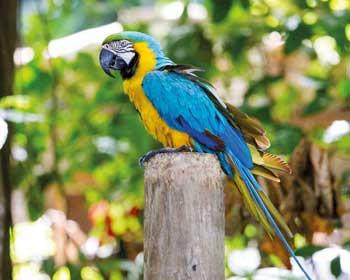 Issuing a statement, the Asia for Animals Coalition, a network of local and international animal protection and conservation organisations further stressed that Suriname is an internationally recognized illegal wildlife trafficking hub. At a recent CITES Standing Committee meeting in November 2023, concerns were raised about the illegal trade in live birds from Suriname following the largest documented seizure of Lear’s Macaws, one of the rarest parrot species in the world, endemic to Brazil.
Issuing a statement, the Asia for Animals Coalition, a network of local and international animal protection and conservation organisations further stressed that Suriname is an internationally recognized illegal wildlife trafficking hub. At a recent CITES Standing Committee meeting in November 2023, concerns were raised about the illegal trade in live birds from Suriname following the largest documented seizure of Lear’s Macaws, one of the rarest parrot species in the world, endemic to Brazil.
“A majority of birds imported from Suriname may have been brought for trade purposes,” said Samantha Gunasekara, Former Deputy Director at Sri Lanka Customs. “Even though there’s a higher number of birds there are only a few varieties; which indicates that there’s a possible attempt to smuggle them elsewhere. Sometime ago, several macaws were caught by the Sri Lanka Navy off Kalpitiya. During the inquiry the Police submitted that the macaws were kept in a ‘tourism hut’.”
Gunasekara further said that there’s a big market for the illegal wildlife trade in India and Bangladesh and therefore Sri Lanka has a potential to become a hub for smuggling wildlife parts and derivatives.
Proper monitoring required
In order to prevent more such incidents from happening, the authorities now need to keep a close watch on all borders of the country. “Even if a permit is issued, regular monitoring of nurseries, turtle hatcheries and other facilities where captive bred animals are being kept will help minimise any potential illegal activities from taking place. The Customs should continue to monitor the borders more closely,” Gunasekara warned.
CEJ ready to file legal action
Environmentalists have raised questions as to why the consignment of birds arrived in Mattala and for what purpose and why the DAPH released the animals back to the importer/suspect, supposedly under the supervision of DAPH officials.
“It seems that the investigations are not being done properly,” observed attorney-at-law Ravindranath Dabare, Chairman, Centre for Environmental Justice (CEJ). “The Customs is currently carrying out investigations, but we are continuing to monitor the case and file legal action,” he added.
Prolonged investigations
The Sri Lanka Customs has been carrying out investigations ever since the consignment had been confiscated. When inquired, M. G. C Sooriyabandara, of the DWC, said that the Department is assisting Sri Lanka Customs with the necessary information. “It is the Customs that will determine whether the consignment is illegal or not because they are the border controlling authority,” he underscored.
Speaking to the Daily Mirror, Customs Media Spokesperson Seevali Arukgoda said that investigations are still underway and that the consignee has not supported them in the investigations. “Therefore we had to resort to some other means to obtain the information,” said Arukgoda.
Several attempts made to contact DAPH Director General Dr. K. A. C. H. A Kothelawala to inquire as to why the birds were released back to the importer and to obtain details regarding the progress of investigations proved futile.
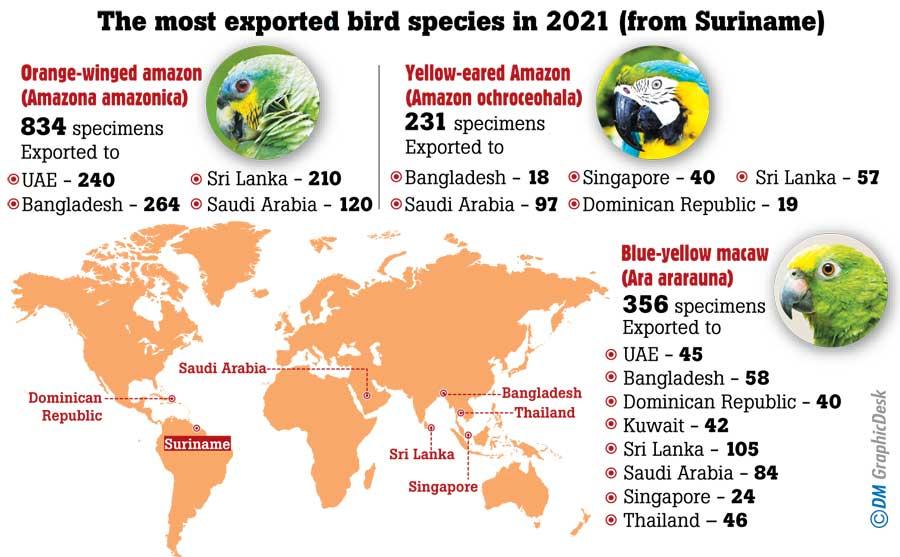
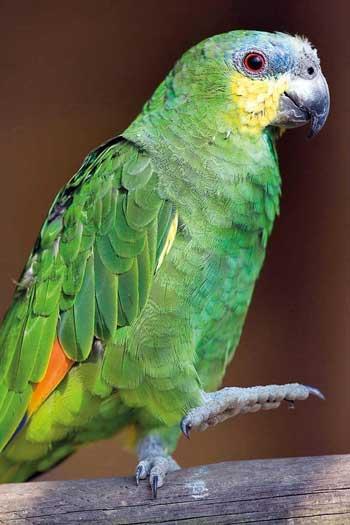
Orange-winged Amazon